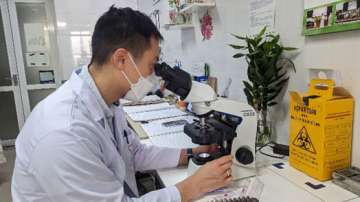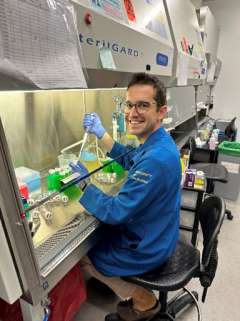Fellow Spotlights
Huan Vinh Dong, MD, MS

Dr. Huan Vinh Dong is currently a Pediatric Infectious Disease Fellow at UCLA interested in molecular epidemiology, particularly of genetic markers of antimicrobial resistance. Prior to completing his medical school at the Charles R. Drew/UCLA combined program and pediatric residency training at UCLA, he earned degrees in Integrative Biology and Theatre/Performance Studies from UC Berkeley and a graduate degree in Nutrition from Columbia University. His previous work has included community health education regarding the prevention and management of sexually transmitted infections and HIV, particularly in young people, social marginalized populations, and global settings.
He is a prior NIH-Fogarty Global Health "GloCal" Fellow and continues to work with international partners at Hanoi Medical University in Vietnam. Huan came to California from Vietnam as a child and is grateful to have the opportunity to bridge his backgrounds through this academic collaboration. His current research supported by the T32 program involves genetic analysis of commensal Neisseria to look for molecular clues to better understand how these non-pathogenic bacteria may be helping pathogens like Neisseria gonorrhea to quickly develop - or rather, acquire - antibiotic resistance.
Aleksandr Gorin, MD, PhD

Dr. Aleksandr Gorin is an MD/PhD trained physician scientist working towards completing his fellowship training in infectious diseases. Upon completion of his MD/PhD, he entered Internal Medicine Residency at UCLA. As an intern, Dr. Gorin saw the effects of the COVID pandemic firsthand, witnessing how the virus spared most with mild symptoms but caused a devastating infection and immune response in the unlucky minority. This experience further spurred his interest in infectious diseases leading him to enter fellowship training with an interest in untangling why some individuals are better "primed" to handle certain infections at baseline.
Dr. Gorin’s prior work focused on the immune response to HIV infection, particularly how T-cells respond to HIV in individuals that can effectively control viral replication without treatment. His research identified how T-cells can occasionally target "critical" regions of the virus that prevent it from escaping immune control. He currently conducts basic immunology research in the lab of Dr. Alexander Hoffmann at UCLA. His research is focused on the innate immune system, the branch of the immune system that acts as the first line of defense the "alarm system" for the body. Specifically, he is studying how certain innate immune cells, called macrophages, can be permanently reprogrammed by various insults; and how this reprogramming alters their long-term ability to respond to subsequent infections or activate the adaptive immune system.